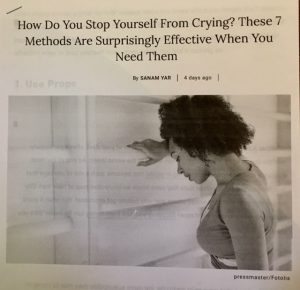I’m a cryer. I cry at weddings and funerals, during the sad parts of good movies or books. In any given situation where it is appropriate to cry, I do. The downside is that I sometimes feel the urge to cry when—at least in my opinion—it is NOT appropriate. The prime example is that I tend to cry when I am furious at something or someone.
It turns out, there’s advice for that.
Yar starts by acknowledging that there are times when people just don’t want to cry—e.g. in public places or at work. As I write, I’ll use “she” and “her” because women are more likely than men to cry. Indeed, 41% of women reported crying at work, compared to 9% for men. So, if you or your character doesn’t want to cry, here’s what Yar recommends.
- Provide a prop, such as a stress ball or scribble pad. Doing something with her hand might distract her.
- Have her pinch the skin between her thumb and pointer finger. Tensing the muscles and doing something may make her feel less helpless. Apparently feeling passive and/or helpless often causes tears.
- Have her take deep, cleansing breaths. It facilitates feeling calm.
- She can pinch the bridge of her nose, near the tear ducts. Indeed, any self-inflicted pain (within limits) can be distracting.
- She can tilt her head back. The tears will literally not overflow for a second or two, providing time to focus on something else.
- She should literally step back from the situation and maintain a neutral facial expression while considering why she feels like crying.
- She can inform bystanders that she needs a moment to gather her thoughts and has to step away for a bit. She may then cry a bit or get over it, but no one will be watching.
While showing strong emotions is easy when you want to show it, showing efforts to suppress strong emotions is often more difficult. Using the techniques above, your reader will get what’s going on without stating it in the narrative.

